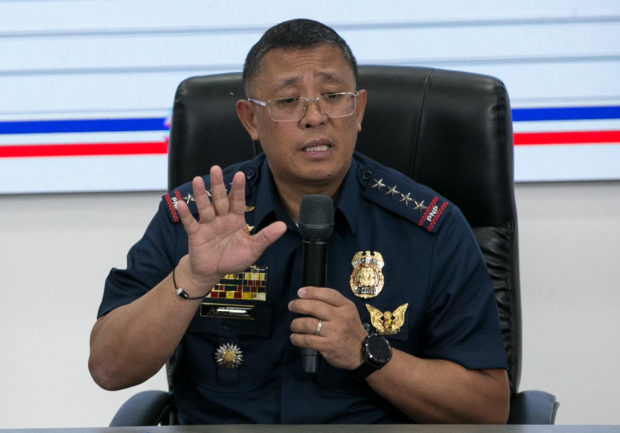
PNP chief Gen. Rodolfo Azurin Jr. (INQUIRER FILE PHOTO)
MANILA, Philippines — The five-member advisory group tasked to screen the courtesy resignations of police generals and colonels as part of the Philippine National Police’s program to weed out those with drug links could use evidence from other government agencies.
“What our panel members will do is to examine well the documents that the PNP already have, and if needed, will get other documents from other agencies of the government so that they can really determine the links of the third-level officers to illegal drugs activity,” PNP Public Information Office chief Col. Redrico Maranan said at the Laging Handa public briefing on Wednesday.
PNP chief Gen. Rodolfo Azurin Jr., one of the panel members, said that aside from intelligence information, they would also look at “other documents,” including drug-related cases the officers were involved in.
The “documentary review and assessment” will be the panel’s basis for determining which of the courtesy resignations should be accepted. Its recommendations will then be forwarded to the National Police Commission for final review before being submitted to President Ferdinand Marcos Jr. for his approval.
Aside from Azurin, other members of the advisory group are former Defense Secretary Gilberto Teodoro, retired appeals Justice Melchor Sadang, Baguio City Mayor Benjamin Magalong, and Undersecretary Isagani Nerez of the Office of the Presidential Adviser on Military Affairs.
Interior Secretary Benhur Abalos earlier appealed to the PNP higher-ranking officers to submit their courtesy resignations by Jan. 31 following reports that up to 10 police generals and colonels in active service were being investigated for alleged links to illegal drug activities.
Of the PNP’s 955 police generals and colonels, only 12 did not comply. Of this number, five had already retired while the other six were about to retire. Only one did not submit a courtesy resignation, citing “personal prerogative.”